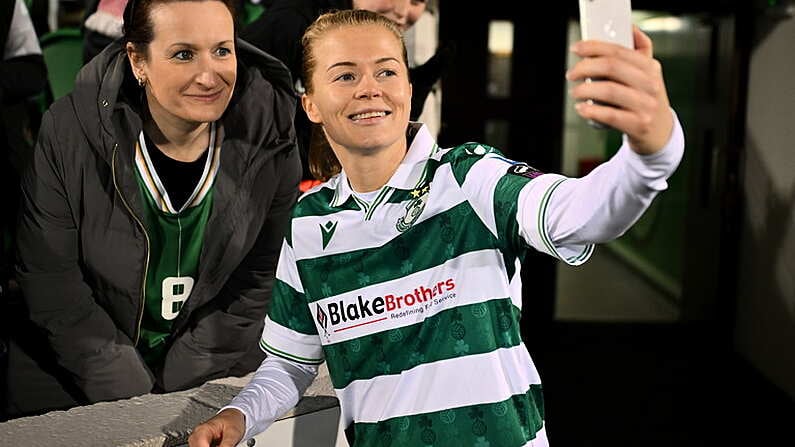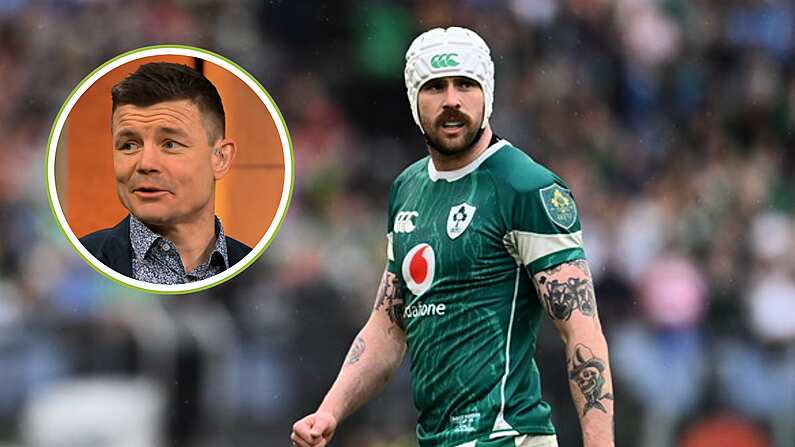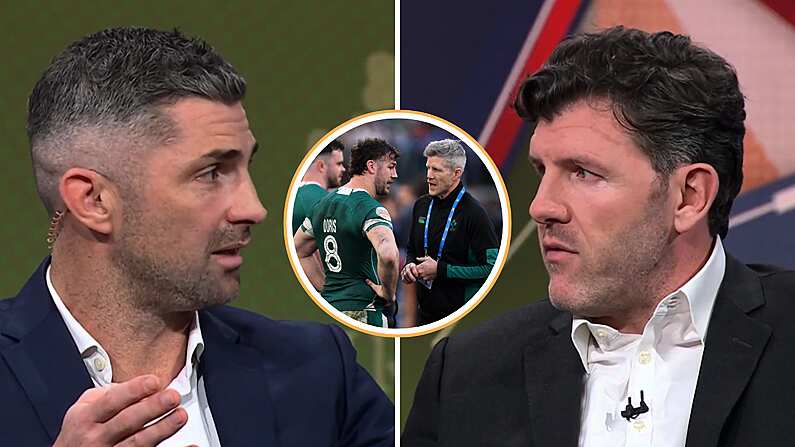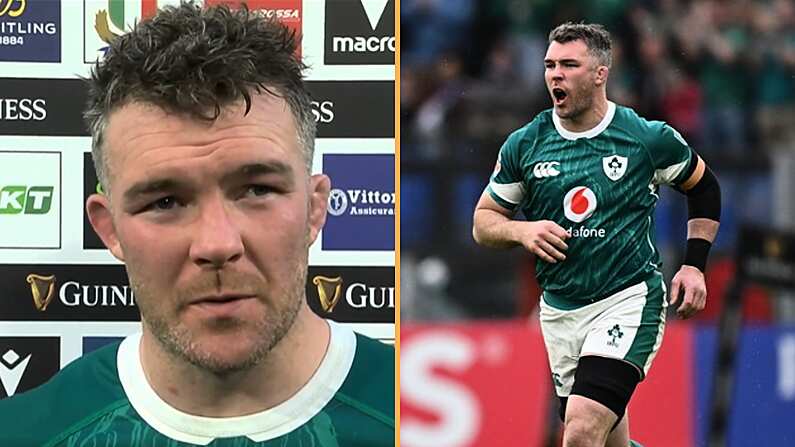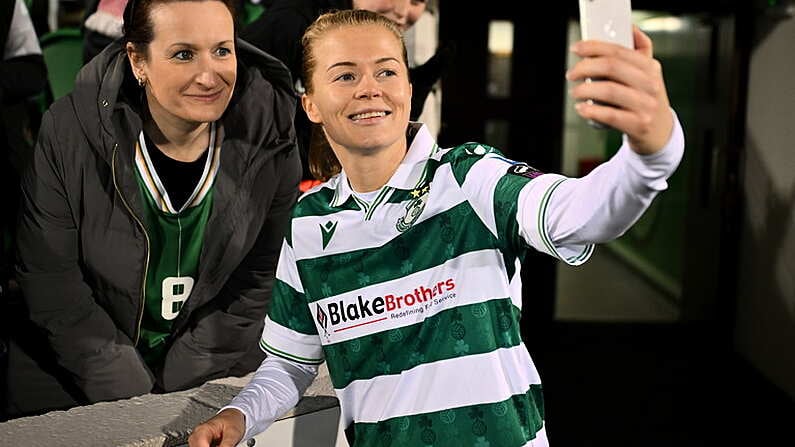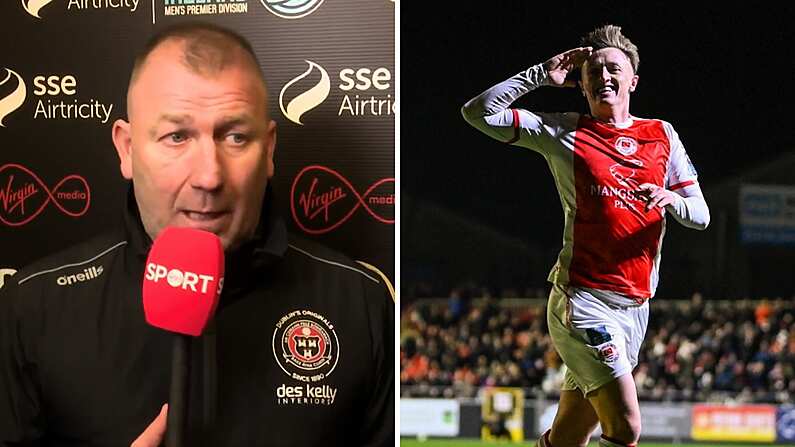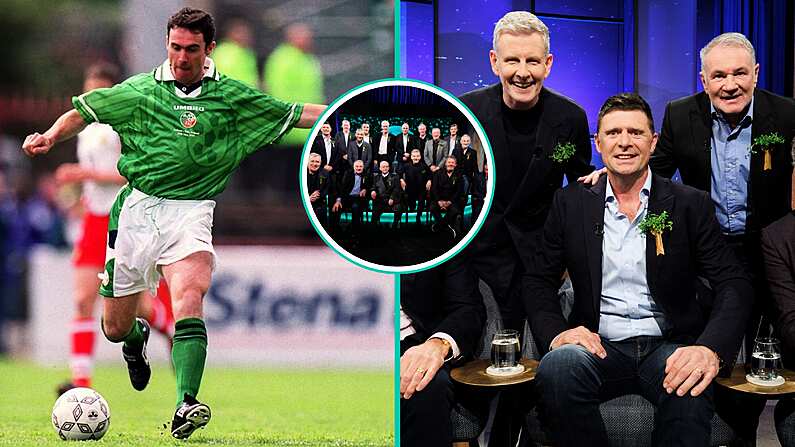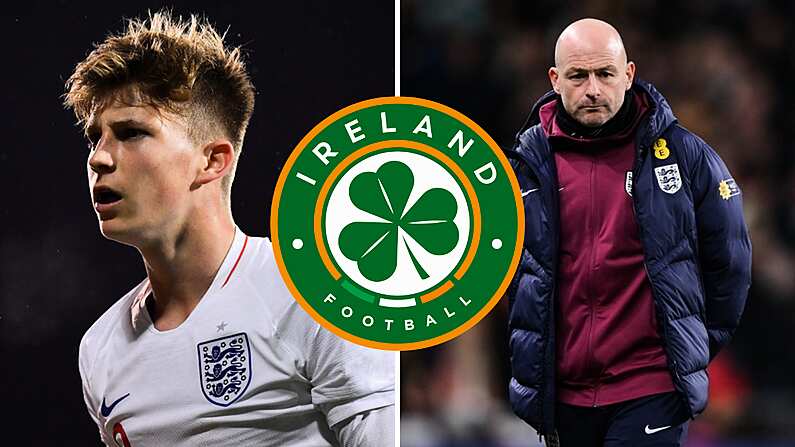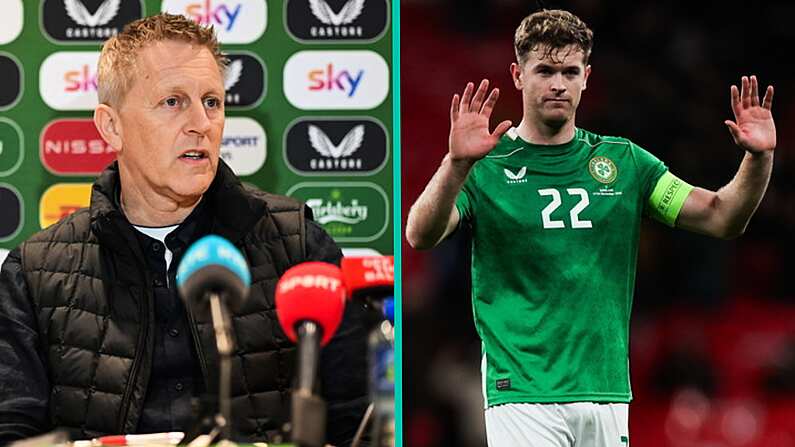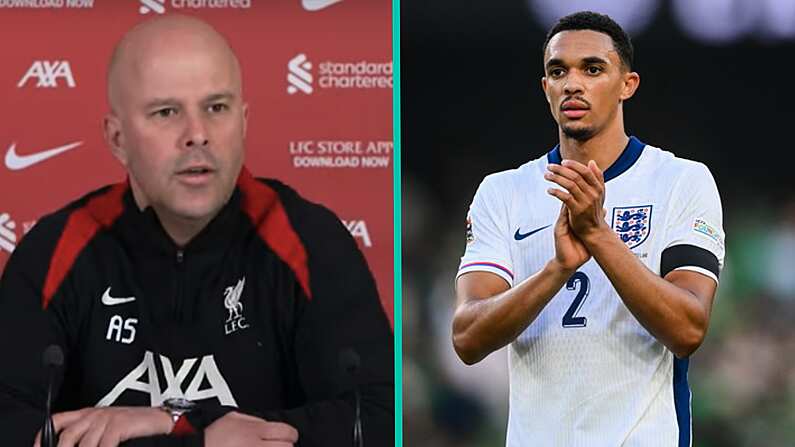We speak to the man who was the driving force behind bringing Wimbledon to Dublin in the 1990s.
When Michael Carruth arrived home from Barcelona with an Olympic gold medal draped around his neck, he was met by the then Dublin Lord Mayor Gay Mitchell and other city officials.
In the giddy aftermath, Mitchell experienced a brainwave. More of a dream, in truth. He took the momentous, and possibly foolhardy, decision to reveal the contents of that dream to the public.
The city of Dublin, he hoped, would one day be capable of hosting the Olympics. The rest of country nearly broke its backside with laughter.
Unbowed, he established a body called the Dublin International Sports Council (DISC) to develop the city as a venue for international sports events. He approached Jonathan Irwin, horse breeder and the manager of Goff's in Kildare, to head up the organisation.
Though not a soccer man, Irwin had been involved in economist Colm McCarthy's audacious proposal to plonk a Dublin-based football team in the second tier of Scottish football.
McCarthy, who remains a prolific contributor to economic discussions on Irish TV and radio, had been an economic adviser to Charlie Haughey's minority government of the late 1980s.
Throughout that time, he was a prominent figure in the drinking clique which became known in media circles as the 'Doheny & Nesbitt's School of Economics'. The Baggot Street pub was then a magnet for media types. By all accounts, you couldn't spill a pint in the place without drenching a journalist or an economist or a political adviser.
According to John Waters, in his 1991 book Jiving at the Crossroads, the only two subjects they were talked about were economics and football.
In early 1990, McCarthy started pushing the idea that a Dublin club enter into the Scottish League. He was supported in this venture by Johnny Irwin, as well as two LOI and Irish football stalwarts, Liam Touhy and Ray Treacy.
McCarthy's argument was coolly rational in nature, unmistakably the work of an economics professor.
It was their pitch that 'professional club football in Dublin, one of the largest cities in the British Isles, has gone into serious and irreversible decline.'
In Ireland, there was a 'market but no product'.
This new club, 'Dublin City', entering the Scottish League would solve both problems in the long-term.
When it came to the messy question of clubs playing outside their jurisdiction, McCarthy stressed the precedent of Welsh clubs playing in the English League and Berwick Rangers, who although in England play in the Scottish League. And rather ironically, he also cited the example of Derry City moving to the League of Ireland.
In an echo of what was to come later, the FAI were at pains to make clear how scandalised they were by the whole project. FAI President Fran Fields said the initiative was 'a stab in the back for the League of Ireland'. The President of the League of Ireland, Enda McGuill, both did and didn't comment when he said that he was 'loath to give the project credibility through public comment'.
Unsurprisingly, given his later stance, Eamon Dunphy was an energetic supporter of the proposal in his Sunday Independent column.
The notion that the Dublin City project constituted a 'stab in the back' for the League of Ireland failed to move Dunphy.
His considered opinion on that point was that 'you can't hurt a corpse by stabbing it.'
He was also sceptical that the Dublin City idea would undermine the League of Ireland in the eyes of the Irish public.
The idea that the League of Ireland could be rendered any less credible than it is, is amusing not to say audacious.
The proposal was eventually scotched by the Scottish clubs. These part-time outfits did not fancy the idea of a professional club from Dublin landing in on top of them.
But the dream of a Dublin-based club playing in the UK didn't die. It would re-emerge in a much more dramatic and high-profile guise four years later.
There are differing accounts as to who first dreamed up the idea of bringing Wimbledon to Dublin. Talking to Balls.ie a couple of years ago, Eamon Dunphy said he first learned of the idea off Joe Kinnear, who rang him sometime in '94 and told him that the club's tennis-loving Lebanese chairman Sam Hammam was eager to sell up. Kinnear asked Dunphy would he be interested in helping the club relocate to Dublin.
Another report in the Sunday Independent indicated that Colm McCarthy was again central. He supposedly alerted Irwin to the fact that Wimbledon were in need of a both a new ground and an infusion of new supporters.
However, Irwin says that he first learned of the idea off his nine year old son Sam.
That was my idea. No, it actually came from my nine year old son who rang me one day, and said 'Dad, there's a really fascinating situation here. There's one Premier League club, its owned by a Canadian-Lebanese family. They've really no fanbase at all'. And so that's how it's all started.
In his role as the head of the Dublin International Sports Council, Irwin wrote to Hammam outlining the proposal.
Hammam's attachment to his possession wasn't exactly a visceral one. The story goes that his chauffeur was driving him through London, animatedly talking about football, when Hammam threw out a line about always wanting to own a football club. The driver perked up and said ‘Why don’t you buy Wimbledon, they’re looking for investors.’
He was very intrigued by the idea of bringing Wimbledon to Dublin from the off. Talk of shifting Wimbledon around like a US football franchise had been aired before, but none of the other sites, Cardiff, Milton Keynes, excited him as much as Dublin.
"Dublin is a fantastically sexy option, what else can I say?", he told the press.
Speaking to us, Irwin said the special cachet Dublin enjoys gave the proposal a certain glamour.
To be honest, for a fan, wouldn't it be more craic and easier to get to Dublin than to get a train to Sunderland?
The other thing is the players. What is the attraction to the wife of an international star of going to Hull or even Manchester? There's some pretty bloody dreary places with good football teams. But Dublin has always had... it's good a style of its own, its got a glamour. I don't think there would have been a lot of difficulty players here. I think in the early years when we didn't have too much money, we might have been relying on golden oldies. But Dublin was always a very attractive site for an idea like this.
Cork property developed Owen O'Callaghan had planning permission to build a stadium in Neilstown in Clondalkin. That he had was a source of some controversy. The site in question was originally designated to be the home of much needed town centre under the terms of the 1983 county plan.
However, the emergence of a rival proposal to build a shopping centre at Quarryvale changed everything.
Notwithstanding the fact that the lands around Quarryvale had been designated as a green-belt, residential area in 1983 plan, and in defiance of warnings from the county manager that such a town centre would be to the north eastern periphery of the area it was meant to serve, South Dublin county council took a deeply controversial decision to rezone the lands around Quarryvale allowing work on the shopping plaza to begin.
The county plan of 1983 was completely torn up. Quarryvale was to be a residential area no longer. The Liffey Valley shopping centre opened there in 1998.
What was to be done with the area around Neilstown? According to Frank Dunlop, the idea to substitute a football stadium in place of the absent town centre was a wheeze dreamed up by Liam Lawlor.
Dunlop told tribunals in later years that the idea was a 'ruse' designed to placate community leaders and enable the Quarryvale plan to proceed unimpeded.
Ruse or not, Owen O'Callaghan became convinced it was a goer and ran with it. He originally envisioned that the stadium would serve as the home venue for the Republic of Ireland team.
The Lebanese family were very anxious and very supportive of coming to Dublin. At one stage we were so close to it.
At one stage, we were so close to it, we had a situation here that Owen O'Callaghan was going to build a 40,000 seater stadium in Clondalkin.
Off-handed references were being made to the possibility of Wimbledon arriving in the media from 1995 onwards. However, it wasn’t until the early days of the 1996-97 season, that it reached the swanky press briefing stage.
A number of journalists were invited to a lunch in the Shelbourne Hotel in the autumn of ‘96. It was the first time members of the Irish media were given access to Sam Hammam.
The consortium were quick to insist they had their ducks in a row. League of Ireland objections would be countered with a £250,000 grant to every club. Hooliganism wouldn't be a problem because the ground would boast a sophisticated security apparatus.
Irwin even says he had done a deal with Ryanair ensuring that Wimbledon's small fanbase would be flown backwards and forwards to Dublin for home games, free of charge.
From memory, Wimbledon had about 6-700 fans. I remember doing a deal with Ryanair where, for two seasons, they would be flown backwards and forwards at no cost.
And everything was coming together very well, and we got it down to an extraordinary price of £6 million. The Dublin Chamber of Commerce reckoned it was worth £2 million a year to Dublin and Ireland.
And Lansdowne marketing did a survey that showed that over 70% of people in the country were in favour of the idea.
The presumption then was that a European Super League was only around the corner. It was inevitable. The phrase was part of the football lexicon during the mid-1990s. It was the buzz-phrase du jour. The organisers boasted that the Dublin club, with all its money and potential, would be there. Irwin contends that the club would have generated huge money very soon.
I think it's fair to say that in the first two seasons, that most of the crowd would not have come to see the home team, the Dublin Dons, but you'd have had 40,000 people every fortnight to see the Evertons, the Arsenals, the Uniteds, and the Citys, and this would have become a very rich team in a very short team.
The League of Ireland gave me the most hope out of all of it... I remember getting it and thinking ‘fucking hell, number one, they’ve written back’ and ‘number two, they’re telling it as it is’… they were the straightest talking people, they were the only ones saying ‘I think it's bad, I don’t think it's right, it's not what football’s about, you got all our backing... ’
In one interview with the English version of the Daily Mirror, the reporter noted that one could 'hear the flaming breath of a dragon snorting down the phone when the names Wimbledon and Sam Hammam are mentioned to him.'
He told the Daily Mirror man that 'the motivations (for the project) are the sort of greed that is enveloping football everywhere right now.'
Appearing on Liveline opposite Owen O'Callaghan in 1997, O'Byrne told presenter Marian Finnucane that the FAI 'weren't interested in Judas money', at which point O'Callaghan, firmly on the defensive, interjected meekly, saying that's 'very unfair'.
In Irwin's estimation, the FAI's unwillingness to even meet to bat the idea back and forth was both frustrating and ultimately fatal to their hopes. It was they who killed the Dublin Dons dream.
The stumbling block, surprise, surprise, was the FAI. We offered them £15 million for junior and schoolboy soccer promotion, we offered them a 40,000 seater stadium in Clondalkin and they wouldn't even meet with us.
I think the Hammams got fed up with the idea that we'd have to waste time making the case to Brussels. And really they lost interest. They eventually sold the club for £36 million well down the line to a Norwegian syndicate. And the rest is history. Which is sad.
Imagine not even seeing the people who are offering you £15 million and 40,000 seater stadium! It was so wrong of the FAI because they're there to promote soccer. And something like this had never been presented to them before but they were so mealy mouthed.
Dreadful. Absolutely dreadful. I mean I'm sure he's a nice man, He was just sort of uncouth and rude and I didn't think there was any call for it. I'm sure he's a nice man and I've met him since and he's in a different world now but I wish he wasn't in that role then.
O'Byrne's perspective is entirely different. He told Balls.ie in 2014 that the consortium behaviour told him they didn't have the best interests of Irish football at heart.
He agrees that the FAI's opposition was pivotal in blocking the idea. He says that FIFA may have sanctioned it had the association laid out the welcome mat.
We told FIFA that ‘we believe it's bad for our football, they don't have the best interests of Irish football at heart, and we want you to block it.'
Irwin said he regards the failure of the scheme as one of his great sadnesses. The opportunity will never come around again. There'll never be another Premier League club in the same curiously insecure space as Wimbledon two decades ago. The FAI failed to grasp the opportunity. Irwin believes Irish soccer has suffered as a result.
I always regard it as one of my sadnesses in life of all the ideas I've had. We still got a situation - well, I'm delighted for Dundalk, that was exciting - but we've really still got an extraordinary situation in that our children wander around Ireland in the insignia of, let's call them foreign teams. You never see them with a duvet of Finn Harps or anything like that.
We have this situation where all our young players want to get a contract in England and domestic soccer stays just about where it is.
We not only would have had the first squad, we've also would have had reserves, and it really put vitality into domestic Irish soccer. But the FAI didn't see that and couldn't see it. I think they felt threatened which was ridiculous because it really would have bumped Irish soccer right up the thermometer.
The opportunity will never be available to us again in this country. it's just beyond us. That was a real chance and we blew it and we blew it because of the FAI.
Read an even more in-depth account of the Dublin Dons story here.


